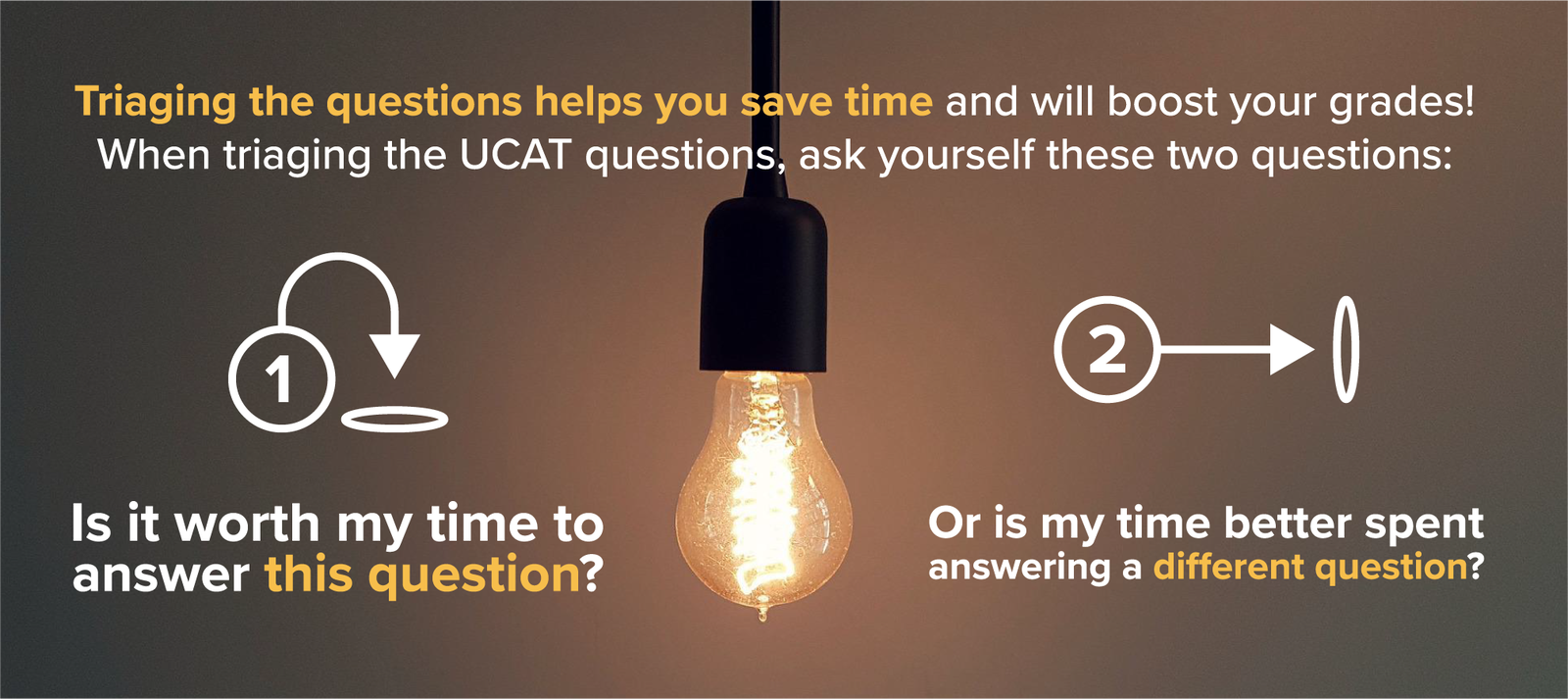So, What Is This Notoriously Difficult UCAT?
UCAT, (which unfortunately has nothing to do with cats 😉) stands for University Clinical Aptitude Test. It is a skill-based test that aspiring medical and dental students must take in the summer before they send their applications to medical or dental school.
Why should you trust me? Well, as a third-year medical student myself, I’ve been through it, and I’m here to guide you through everything you need to know to get through your UCAT successfully.
The UCAT for Medicine
The UCAT exam is used for medicine and dentistry in the UK. The exam itself does not change depending on whether you are applying for medicine or dentistry, so aspiring dental and medical students sit the same style of exam.
BMAT vs UCAT
Note that not all medical schools require their applicants to sit the UCAT. The majority do, but some medical schools require you to sit the BioMedical Admissions Test (BMAT) instead. The BMAT is a fairly similar test to the UCAT, but it has some differences:
| UCAT | BMCAT |
| skill-based | skill-based |
| three sections | five sections |
| computerised exam | written test |
| several possible dates | only one test date |
| accepted by most universities | required at specific universities |
You don’t have to sit the BMAT and the UCAT, but you need to sit one or the other. Most universities require the UCAT, so that’s your best bet if you’re only going to take one of them. However, you can choose both if you want to keep your options open.

First Up: UCAT Registration
OK, now that we have the BMAT out the way, you need to know that you can only sit the UCAT once per application cycle. There is no option to resit the exam until the next application cycle.
You can register for the UCAT here, during a specific time period every summer. UCAT tests take place from mid-July to mid-September and applications are open throughout this time period. I recommend that you book a date as early as possible because you will likely have to start studying for your A-Levels from September onwards.
What is the Best Time to do UCAT? How Long Do You Need to Revise for UCAT?
Although the exam period lasts about two months, you should consider your options when selecting a date. You should do your UCAT test at the latest mid-August if you intend to prepare for BMAT (you need to study for that too!).
On the other hand, you shouldn’t rush with your registration either. Make sure you are well prepared to take the exam, as you can only sit UCAT once a year.
I recommend giving yourself at least 4–6 weeks of preparation before sitting the UCAT. This gives you enough time to practise and perfect the techniques required for each different style of question and practise some timed mock exams as well.
UCAT Registration Rules
UCAT is an official exam and it comes with a few rules you need to follow when registering. Boring though it is to read the rules, you should be aware of the following:
- You must register in your own name, and you can create only one account.
- The name you use must appear exactly as it does on the photo ID you will use when you present it as evidence to sit the test.
- Remember that when you register with UCAS (University and College Admissions Service), your name must be the same as the UCAT application name so that the results can be matched to your application.
- When you open an account, a registration email should arrive in your inbox within 24 hours containing a password to log into this site.
It is possible to change the test date at no charge up to 24 hours before your scheduled test day.
Who Gets the UCAT Results?
Your UCAT account is directly linked to your UCAS account. This means that your results can be shared with the medical schools that you apply to. You will also get your results on a piece of paper on the day. You can decide whether to open this in the test centre and check or wait until you are outside the centre.
Do not feel pressured to open it in front of everyone in the test centre! You must decide what works best for you and helps you feel most comfortable 😊.
What If I Have to Take the UCAT Again?
If you have to sit the UCAT again next year for any reason (for example, if you miss your grades this year), you need to reapply and sit the UCAT the same way as you did the previous year. Nothing about how you apply, when or where you sit the exam, or the importance of it will change.
The advantage of doing the UCAT again is that you get another chance to practise, and you’ll be familiar with the test come exam day! This often leads to an increase in your UCAT score because you’ll be calmer the second time around. For me, this meant a jump from around 2460 the first time I sat the UCAT to 2680 the second time. This opened up new universities and bolstered my application. So, if all goes wrong the first time, try to find the positives and change your mindset!
Structure Your UCAT Revision Around These 3 Factors
Your UCAT preparation guide will all come down to three factors: your timing, your preparation for each different style of question, and your ability to cope with pressure and nerves on the day. Each of these requires a different coping mechanism and study strategy.
Timing
Timing is one of the most critical factors in the UCAT. Your ability to execute good timing in each section will be the difference between achieving a fantastic score and a bad one. I recently saw a testimonial from an A-Level student who said:
‘I would actually enjoy preparing for the UCAT if it didn’t go towards anything, and if the exam wasn’t so time-pressured.‘ – A very honest student 😉
I agree – the UCAT itself can be quite fun! If you take out the time pressure, it’s just a very long problem-solving exam.
The best way to master the timing issue is to jump straight into learning the different techniques needed for each section of the UCAT. Once you’re comfortable with the technique, practise it under timed conditions (basically, perform the timed mock exam). Don’t neglect the timing aspect of the exam at any point in your preparation!

Style of Questions
Each UCAT question needs a specific technique (at least if you want to answer them efficiently and effectively). Don’t be one of those students who think that ‘the UCAT is just an aptitude test, so there’s no need to prepare for it.’ Learning the different techniques behind each different style of question is crucial.
There are 15 or so different styles of questions in the UCAT. Remember, there is an entirely new style of question in the Situational Judgement section of the UCAT since 2022, so remember to take this into account. This question will ask you to list some scenarios based on how appropriate they are, and there are usually three or so questions in this new format.
So, 15 different styles of questions mean that you need to have 15 different techniques. Every time a new question comes up on the day of your exam, you need to know precisely what your plan is for that question. And in addition to understanding the exact technique you need to use, you also need to be great at triaging!
Triaging helps you save time and will boost your grades significantly! (This means you have to sort through questions and decide which questions to answer and which to skip.) Since some questions are literally impossible to answer in the given time, triaging is essentially making a quick decision after asking yourself, ‘Is it worth my time to answer this question? Or is my time better spent answering a different question?’
When triaging, there are two potential outcomes:
- This question is either too long or too difficult to justify spending so much time on it when I might not even get the right answer. My time is better spent moving on and answering a question I’m more likely to get right.
- This question is manageable. I will likely get the correct answer after spending a relatively short amount of time on it.
Your ability to triage will improve the more you prepare. A question you decide is not worth answering might be worth answering for someone else, so do not base your triaging technique on another student!

(Under)Pressure
Another factor that will determine whether you perform well in the UCAT will be your ability to cope with the pressure of the exam. It is a long and important exam, so it’s completely natural to feel nervous on the day and on the days leading up to the exam.
The main way to deal with the pressure of the UCAT is by replicating exam conditions beforehand. For me, this meant setting up every mock like it was the real thing. I would do my mocks at the same time that my UCAT exam was booked for. I even wore the same clothes that I would wear on the day. It was also crucial to eliminate all distractions and ensure I used the same time conditions for the exam.
I also researched the exam centre where I was going to sit the UCAT, and I visualised the entire process that would happen on the day, from entering the centre to showing my ID to sitting the exam to opening my results. This meant I knew exactly what was going to happen on the day.
Some of these preparation factors may seem over the top, but if you want to perform optimally and calm those nerves, consider implementing some or all of these factors!

The UCAT Exam 2022: What’s New?
Some changes have been introduced to the format of the UCAT in 2022, so make sure that the revision materials you use are updated with these changes! Let’s have a look at them:
- The Quantitative Reasoning section has one more minute – it is now 25 minutes in total rather than 24.
- Abstract Reasoning now has five questions fewer, (i.e., 50), with one minute less to complete this section.
- Situational Judgement has three questions fewer, (i.e., 66). The time to complete this is the same.
- There is now a new question format for the Situational Judgement section. This new question will give candidates a number of factors, usually three, and ask them to identify the most and the least important of the selection in terms of a given scenario.
If you are attending a UCAT crash course day or paying for any revision materials, like online platforms, ensure that those platforms and materials are up to date with the new format changes in the UCAT exam.
How Does UCAT Work: UCAT Exam Questions
Alright, let’s get to the nitty-gritty of it and look at what types of questions you can expect in the UCAT. Game face on!
Each section comes with a different number of questions and time to answer them. Here’s a breakdown:
Verbal Reasoning
This section of the UCAT exam tests your ability to read quickly, source information, and then answer questions based on the information you have just read. It is basically the English literature and Language aspect of the UCAT. However, many students that excel in these subjects still struggle with this section of the UCAT.

Each text has 200–300 words. You’ll have to read the text and then answer the questions that follow in the allocated time. This could be 3, 4, or 5 questions relevant to the text. An important thing to look out for in this section is the use of extreme words. Any time you see the word ‘all’ or ‘every’, make a mental note as the questions that follow may refer back to these specific sentences.
Many students struggle when deciding whether to read the passage or the question first in this section. My advice? Try both and see which one works best for you! Make sure to underline keywords in both – they will help you locate the answer.
How to Get Better at Verbal Reasoning?
In order to get the most out of this section of the test, pay attention to the following when you study:
- Know question styles and how to treat them.
- Understand the difference between True, False, and Can’t tell.
- Be careful about common traps: negative questions, vague information, contradictions.
- Don’t use external knowledge – all the information you need is IN THE TEXT!
- Don’t dwell on it. If it takes you too long to figure out what the answer is, it’s probably can’t tell.
- Read the entire question/text. Don’t guess.
- Practice, practice, practice.
- learn to speed read (skimming through passage to get the gist and find keywords)

Decision Making
Decision-making is one of the stranger parts of the UCAT, as you likely have never seen anything like it (it might even give you IQ Test vibes). Decision-making is very important for future medical students. You’re applying to study medicine, so problem-solving and quick decision-making should be your strong suits.
There are a few different styles of questions that you can come across in the decision-making section. Most UCAT decision-making questions are presented in a multiple choice ‘best out of four options’ format.

How to Improve Decision-Making in UCAT?
Remember, this section of the text tests your logical reasoning. It focuses on evaluating arguments, deductive reasoning, and statistical and figural reasoning. As a future doctor, you have to be able to make decisions under time pressure, like you do in UCAT. These tips will help!
- Work on your ability to triage.
- Learn to recognise strong and weak arguments.
- Don’t ASSUME anything, read the entire question before answering.
- Double-check your probability calculations (write things down in a way that helps you have an overview).
- Don’t dive straight into data (lots of it is irrelevant). Make sure you understand what is being asked.
- Use your whiteboard effectively and efficiently.
- The target is the answer, not the full diagram.
- Watch out for the wording – absolute statements are usually not the right choice.
- Answer all questions – there are no negative points, and you may guess correctly!

Abstract Reasoning
The abstract reasoning portion of the UCAT is another strange section but also fun! It tests your ability to spot patterns and determine what would come next in the sequence. You will get diagrams with lots of different shapes, coloured or uncoloured, and you’ll have a few seconds to work out the rule that determines the design of the diagrams.
For example:

In the first row, you have a sequence. Your task is to recognise the pattern and select the option that logically follows the set pattern.
There are other styles of questions too. For example, a question might present you with two sets of diagrams: Set A and Set B. These two sets each have their own patterns. You have to work out what each of these patterns is, similar to the example above. Then, the question will give you a new image and ask whether it belongs to Set A, Set B, both, or neither. You will get much better at this over time – just don’t forget to include the time pressure in your revision.

Our Top UCAT Abstract Reasoning Tips
Common mistakes in this section include not focusing on pattern recognition and not practising under timed pressure. Avoid these pitfalls.
- Determine what kinds of patterns often come up in the test (colours of shapes, the number of sides on the shapes etc).
- Keep a list of possible patterns.
- Check for repeated features.
- Observe positions of shapes.
- Use mnemonics to help you remember details better. (CPR wil help – Colour, Position, Rotation)
- Keep a list of patterns while revising and work on them systematically.
- Remember the number of sides of common shapes.
- If you can’t figure it out – guess and move on!

Quantitative Reasoning
The quantitative reasoning part of the UCAT basically tests your maths skills. Don’t worry about the difficulty level; it’s basically at your GCSE maths exam level. For this section, you need to be able to rely on your mental maths. One common theme in this section is your ability to use percentages. This could include calculating percentage increases or decreases.
On top of this, other common questions involve rates and interest. These often also include percentages, so it’s imperative to become familiar with these. As well as doing this, you should review the different types of averages, including range, mean, mode, and median.

Work on Your Quantitative Reasoning
This section may require you to work with numbers, but not all of them will be stunningly difficult to compute.
- Know how and when to use the calculator.
- Memorise calculator shortcuts.
- Practice calculating simple things without the calculator, You don’t really need to check that 2×10 is 20.
- Don’t be tricked by unit changes.
- Learn to estimate the result.
- Work on recognising multiple-step calculations.

Situational Judgement
This section of the UCAT is essentially a different sub-test within the UCAT. It is graded separately from the UCAT as you’re given a ranking in the form of a band. A Band 1 score means you did really well (with Band 4 being the lowest). Most universities require you to get a Band 1 or Band 2, but some only require that you score higher than a Band 4. Some universities have even completely ignored this section in the past!
Situational judgement questions test your ability to act in different situations. Since 2022, there is a new question in the Situational Judgement section that tests your ability to decide which answers are best and worst. In addition, there will be the usual questions where you rate a response to a scenario on a scale from appropriate to inappropriate. Your answers are judged against a panel of healthcare professionals. The closer your answers are to the panel answers, the higher your band.
An example of a situational judgement question scenario could be the following:
‘You are a third-year medical student on placement in a local hospital ward. Whilst carrying out an exam on a patient, the consultant that you are shadowing makes a derogatory comment about the patient’s weight. How appropriate are the following responses?’
You would then be presented with options such as:
- Say nothing; it’s none of your business.
- Shout at the consultant in front of the patient.
- Pull the consultant aside after the patient has left and ask about their actions.
You would then have to say whether those responses were the most appropriate, least appropriate, and so on. Remember, this is only one type of question; there are other styles!

Top Tips to Help You Boost Your Situational Judgement
This is a new type of question, which has probably caught many students off-guard. Worry not, with these tips, you’re bound to improve your results!
- Read GMC’s (General Medical Council) publication Good Medical Practice.
- Understand the four pillars of medical ethics: autonomy, beneficence, non-maleficence, justice.
- Get into the mindset of an ideal professional and answer accordingly.
- Answer all questions – even partial answers count!
- Be as objective as you can.
- Learn about confidentiality.
- Get acquainted with rules of professionalism and social media (e.g., don’t reveal specific information online).
- Understand the rules of consent.
- Be on top of your communication, teamwork, and problem-solving skills.
Work on keeping your focus. SJT comes at the end of UCAT, and many students are burnt out. Avoid this by doing the entire mock test several times before the actual day.

Almost D-Day: The Day before the UCAT Exam
So, it’s the day before the exam! You’ve completed your 6–8 weeks of preparation (hopefully!), and now it’s time to get ready for the exam. How should you prepare yourself the day before the exam and on the day itself?
Your routine here will be extremely important. Utilising an effective routine consistently throughout your 6–8 weeks of preparation and then replicating this routine on exam day and the day before your exam will go a long way in calming some of your nerves. The exact routine you use does not matter, but keep it consistent to make the days leading up to your exam as ‘normal’ as possible.
Keep this in mind as your exam approaches:
- Do NOT try to learn anything new on the day before the exam.
- Quickly go through details on each section (timings, question styles, solving strategies), but don’t dwell on it.
- Do something relaxing.
- Prepare all your documents (ID, confirmation email, address of the test centre etc)
- Go to bed early.
- Have a healthy breakfast on the day (UCAT is a long exam, you need food!)
- Leave the house on time, you know how the traffic can be.
- Don’t panic – hard though it may be, try to keep your wits about you.
Watch the Clock! UCAT Timings
There is serious time pressure in the UCAT exam. I can’t overstate the importance of getting used to the timing aspect of the it. Don’t leave it until a week before the exam to get used to the timing; instead, implement some aspects of time pressure into your practice sessions from the very start. I also recommend that you do a timed mock as soon as you begin your UCAT preparation, as this will help you understand the time pressure level in the exam.
Here’s a table of the different sections of the UCAT and how much time you have in the section and for each question.
| Section | Number of Questions | Time | Time Per Question |
| Verbal Reasoning | 44 questions | 21 minutes | 30 seconds |
| Quantitative Reasoning | 36 questions | 25 minutes | 40 seconds |
| Decision Making | 29 questions | 31 minutes | 54 seconds |
| Abstract Reasoning | 50 questions divided into 12 sets | 12 minutes | One minute per set |
| Situational Judgement | 66 questions | 26 minutes | 23 seconds |
UCAN Do It!
I hope this guide has been helpful to you! If it was all TL;DR (which I hope it wasn’t 😃), just make sure you read our tips with the lightbulbs next to them. Prepare as best as you can (especially practising under time pressure), and remember: You can always write this exam again if you don’t get the grade you want the first time. Keep as calm as you can, take a deep breath, and eat something before the exam, and you’ll be just fine!












